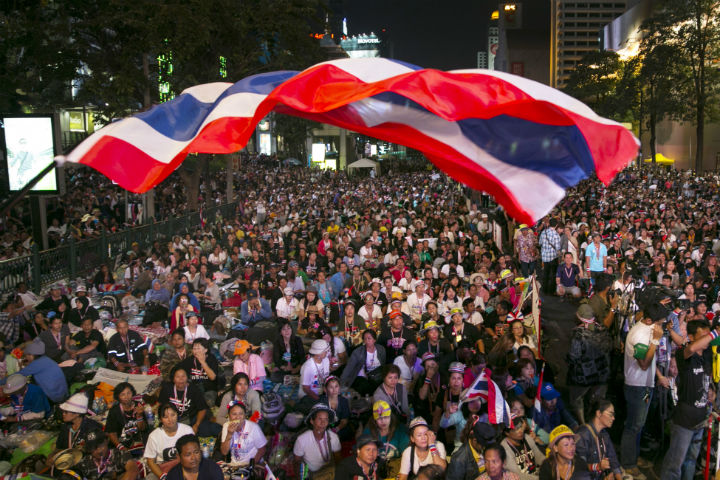Tens of thousands of demonstrators blocked of the streets of Bangkok for a second day on Tuesday, fulfilling a promise to shut down central Bangkok until Prime Minister Yingluck Shinawatra resigns.

It’s the biggest demonstration Thailand has seen since 2010, when mass protests turned deadly.
Yingluck faces continued calls to step down or be removed from office, with opposition groups accusing her of being a puppet for her brother — deposed Prime Minister Thaksin Shinawatra.
Global News takes a brief look at the who’s protesting and why.
Who is Yingluck Shinawatra?
Yingluck Shinawatra won the 2011 general election months after supporters of her brother, former Prime Minister Thaksin Shinawatra, clashed with military troops and 91 people were killed. (Yingluck’s predecessor Abhisit Vejjajiva was charged with murder in 2012 in connection with the deaths of the protesters in 2010.)
Yingluck was criticized for having a lack of political experience.

Get breaking National news
The 46-year-old has degrees in political science and business from the University of Kentucky and a managerial background — as managing director of her billionaire brother’s telecommunications company and with another family-owned business — but never held any governmental position before taking the country’s top post.
What are the protests about?
Most of the criticism against Yingluck is that she is only a front for her brother’s political agenda.
The Financial Times wrote, “A political novice turned premier she was infamously described by Mr. Thaksin as his clone, yet until a month or two ago she had managed to restore a relative peace that her brother and his other allies spurned.”
Thaksin was ousted in 2006 in a bloodless military coup. After returning from exile in Feb. 2008, he later fled to the United Kingdom to evade trial on corruption charges.
Since his ouster, the country has been divided along pro- and anti-Thaksin lines.
The Associated Press reports Yingluck’s opponents allege she is “using the family fortune and state funds to influence voters and cement its power.”
As of Tuesday, Yingluck remained defiant and declared she will not resign. Her government called an election for Feb. 2, but her opponents vow not to take part.
They want political reforms put into place before an election is held.
READ MORE: Travelling to Thailand? What you need to know about the protests
Who’s behind the protests?
The protests are largely organized by the People’s Democratic Reform Committee (PDRC), as they have been since beginning in November 2013.
According to The Associated Press, PDRC wants “the government to hand over power to an unelected ‘people’s council,’ a group of 300 people chosen by organizations representing various professions and 100 of their own nominees. The council would amend laws to fight corruption and institute other reforms, while an appointed prime minister would help administer the country for up to two years.
Another group called the Network of Students and People for Reform of Thailand (NSPRT) has also spent months protesting the Yingluck’s leadership and that of her government. NSPRT is also demanding a “people’s council” government.
*With files from The Associated Press



















Comments